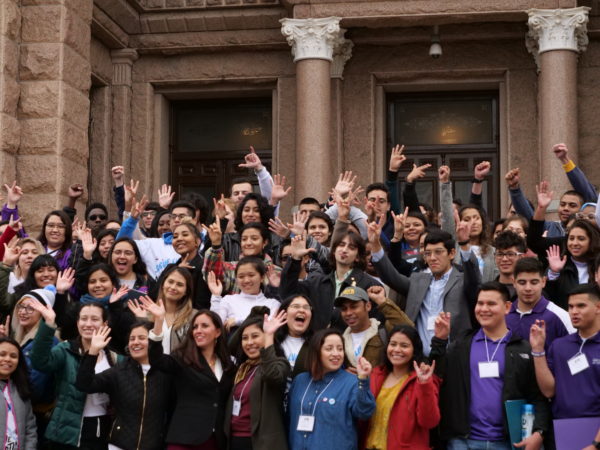(By ANTONIO CUETO)
Latino-rights nonprofit organization Jolt rallied outside the Texas Capitol during the 86th Texas Legislature. The March 1 event was to raise awareness over higher education affordability.
The group visited legislators in their offices to lobby for their support of Senate Bills 32, 33 and 37, prior to the rally held at the south steps of the Capitol.

(ACC Star Photo by Antonio Cueto)
Senate Bills 32 and 37 establish the Texas Promise Grant Program to make tuition free for certain students at two-year public institutions of higher education.
Senate Bill 37 abolishes the existing regulations that deny professional licenses to higher education graduates holding student debt.
At the rally, which was titled “Jolt Advocacy Day,” founder Cristina Tzintzun Ramirez, and former state senator and Democratic gubernatorial nominee Wendy Davis spoke in support of the efforts made by the organization.
“We are committed to tearing down the obstacles that limit and discriminate against our diverse youth,” Jolt stated on its Facebook page.

(ACC Star Photo by Antonio Cueto)
Political science student at the University of North Texas Rudy Vela hosted the rally. Vela has a personal stake in this issue because he, like many of the students present at the event, has taken out loans in order to attend college.
“Texas does not focus enough in higher education,” Vela said. “I would like to see the Texas government set a bigger focus on higher education affordability.”
Vela has been involved with Jolt since the 2018 voting cycle. Last summer he worked as a voter mobilization fellow leading up to the elections. His team was able to register nearly 500 voters across the Dallas-Fort Worth area. Currently he is focusing his efforts on establishing a chapter of the organization on his university campus.

(ACC Star Photo by Antonio Cueto)
Vela graduated from high school in Laredo, a city sitting on the U.S.-Mexico border. Though he did not face any setbacks because of his background while growing up, the stories of struggle from his family and friends motivated him to take action.
“The biggest challenge we face as an organization is the lack of information,” Vela said. “People refuse to believe the truth because of political ideology.”
Part of the work that Vela does through Jolt is engaging directly with the Latino
community by assisting them with registering to vote, educating them on the issues that are on the ballot, deputizing people to register other voters and helping them fill out voter pledge cards.
“Our work does not only serve the Latino community, it helps the United States
collectively,” Vela said. “We want people to realize that fulfilling their civic duty is more important than it seems. Jolt aims to provide the tools needed to amplify one’s voice within their communities.
“Jolt allows individuals to tell their stories, because through personal stories and
testimonies is how we are able to make true change.”
Vela, who will graduate in May, hopes to see change in the Texas legislation in the near future that increases college affordability. He also wants to see a growth in focus from the legislation on mental health concerns regarding college students.
“It is a big issue that often lies under the radar,” Vela said. “Forty-one percent of students surveyed by the American Psychological Association said that anxiety was their biggest concern, followed by depression at 36 percent.”
Vela hopes the Latino community becomes more politically active as they are projected to be the racial majority by 2030.
“People are often afraid of the government and that shouldn’t be the case,” Vela said. “The government should be scared of the people they serve because we are the majority. We elect them. They should not only represent us, but listen to us and make tangible change.”




